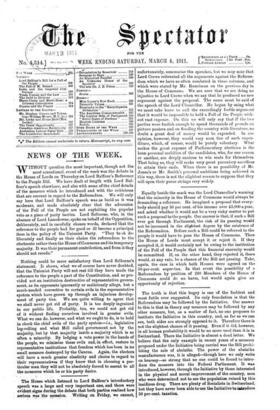Nothing could be more satisfactory than Lord Selborne's statement. It
shows, what we of course have never doubted, that the Unionist Party will not rest till they have made the reference to the people a part of the Constitution, and so pro- vided not an institution destructive of representative govern- ment, as its opponents ignorantly or maliciously allege, but a much-needed corrective to certain evils in the representative system which have grown up through an injurious develop- ment of party ties. We are quite willing to agree that we shall never get rid of party. It is too deeply ingrained in our public life. Probably, too, we could not get rid of it without Ending ourselves involved in greater evils. What we can do, however, and what we ought to do, is to hold in check the chief evils of the party system—i.e., legislative log-rolling and what Mill called government not by the majority, but by that majority inside a majority which is so often a minority. By lodging a veto power in the hands of the people, we minimise these evils and, in effect, restore to representative institutions that freedom which has been in no small measure destroyed by the Caucus. Again, the electors will have a much greater elasticity and choice in regard to their representatives if they know that in choosing a par- ticular man they will not be absolutely forced to assent to all the measures which he or his party desire.










































